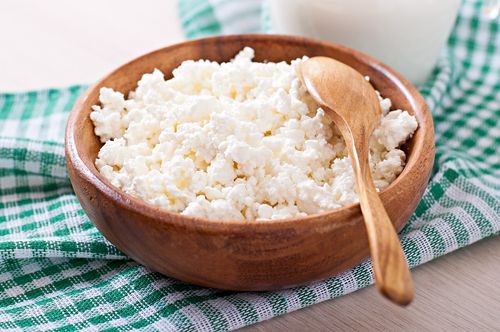Is Cottage Cheese Bad For You?
Short answer
Cottage cheese if very good for you if not eaten in excess. Too much can cause problems, so moderation is key.
Recommended Alternative
Very beneficial to your health. Things rated a 'B+' may have a few harmful qualities to pay attention to.
View Full Grading System
Category 'A'
Very healthy and numerous health benefits. Side effects are rare. Things rated an 'A+' are typically necessary for survival (for example, water).
Very healthy and numerous health benefits. A few harmful qualities may be associated, but only under certain circumstances such as an allergic reaction.
Very healthy and numerous health benefits. Harmful qualities may be associated, but aren't usually serious.
It is important to note that even the best things in life can become bad in immoderate amounts. So, although something may be rated an 'A+', overconsumption/overdoing can bring unwanted effects.
Category 'B'
Very beneficial to your health. Things rated a 'B+' may have a few harmful qualities to pay attention to.
Overall beneficial to your health. Things rated a 'B' may have some harmful qualities to pay attention to.
More beneficial to your health than not. However, harmful qualities are most likely associated and shouldn't be overlooked.
The main difference between category 'A' and category 'B' is the harmful qualities typically present in 'B' items. Serious side effects are usually uncommon, but are still possible and should be taken note of.
Category 'C'
Both beneficial and harmful qualities associated. Things rated a 'C+' are typically a bit more on the beneficial side. Still, moderation is important.
A fairly even ratio of beneficial and harmful qualities. Moderation is important. Very general topics that can lean towards both sides of the spectrum will be placed here as well. Rice, for example, can be good or bad depending on the type.
More harmful than beneficial. Side effects are common, especially when consumed/done excessively. Moderation is very important.
Category 'C' usually denotes to both good and bad qualities. When it comes to this category, it is important to keep this word in mind: moderation.
Category 'D'
Harmful to your health. Although benefits may be associated, the bad most likely outweighs the good. Moderation is very important.
Harmful to your health. A few benefits may be associated, but the bad outweighs the good. Moderation is extremely important.
Harmful to your health. Very few, if any, benefits are present. Things in this category should be avoided as much as possible.
Category 'D' is typically for things that are more harmful than beneficial. While consuming/doing something unhealthy once in a blue moon shouldn't hurt, we definitely recommend eliminating 'D' items as a regular part of your routine/diet.
Category 'F'
Category 'F' is for things that fail to bring anything beneficial to the table, and are very harmful to your health. We recommend completely avoiding anything in this category. Long-term side effects of 'F' items are usually very serious.
Category 'N'
'N' stands for neutral. Things placed into this category are generally (a) neither good nor bad for you, or (b) lack the necessary evidence to reach any conclusions.
Long answer
Cottage cheese is made by draining cheese curds (whereby some whey remains). Unlike other forms of cheese, cottage cheese is actually quite healthy and is a preferred food by many health conscious people, including people on a diet, bodybuilders, and runners. Compared to cheddar cheese, which has over 400 calories per 100 grams, cottage cheese only has 98 calories for the same amount. In addition, cottage cheese has a high protein content, especially casein, which is necessary for cell function and helps provide energy and build muscle. Cottage cheese also contains beneficial bacteria, which help break down foods and better absorb nutrients.
Full-fat and low-fat cottage cheeses do contain saturated fat, but also have good fats, including trans-palmitoleic acid. According to a Harvard study, people with high levels of trans-palmitoleic acid in their systems are three times less likely to develop type-2 diabetes. Also, cottage cheese comes in several varieties, such as low-fat, fat-free, and mixed with fruit. In addition, cottage cheese has a wide range of applications. It can be eaten alone, used as a substitute ingredient (often for ricotta cheese), or enjoyed as a side dish.
There are some possible dangers of eating too much cottage cheese, due to the high protein and high sodium content. Too much protein in one's diet can lead to kidney problems, whereas too much sodium (of which one serving of cottage cheese has nearly half the daily allowance) can increase blood pressure. Also, people who have dairy allergies or are lactose intolerant should, of course, avoid cottage cheese. Eaten in moderation and in conjunction with other health foods, cottage cheese is a good part of any healthy diet.
Possible long-term side effects
- increase of blood pressure
-
kidney problems from excessive amounts of protein (rare)
Ingredients to be aware of
Benefits
- promotes weight loss
-
promotes sustained energy
-
reduces risk of type-2 diabetes
-
great source of protein
Our Wellness Pick
(what is this?)
Good Culture Cottage Cheese
- Organic Product
- Rich in Protein
- Whole Milk Benefits
- Non-GMO
- Gluten-Free
Learn More!
Please turn your Ad Blocker off to see this content. Thank you!
Thank you for your feedback!
Written by Jeff Volling
Published on: 01-01-2016
Last updated: 12-15-2023
Thank you for your feedback!
Written by Jeff Volling
Published on: 01-01-2016
Last updated: 12-15-2023

 Approved by
Approved by 















